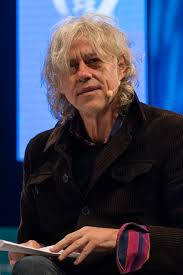
Introduction
Bob Geldof, an Irish musician, songwriter, and humanitarian, is widely recognised for his contributions to the music industry as well as his philanthropic efforts. Best known as the founder of the Band Aid charity supergroup and the Live Aid concert, Geldof’s activism has helped raise significant funds for famine relief in Ethiopia. His impact continues to resonate in global humanitarian efforts, making him a prominent figure in both music and philanthropy.
Career in Music
Born on October 5, 1951, in Dún Laoghaire, Ireland, Geldof initially rose to fame as the lead singer of The Boomtown Rats, a rock band that enjoyed considerable success in the late 1970s and early 1980s. Their hit single ‘I Don’t Like Mondays’ was a significant cultural marker, encapsulating the socio-political climate of the time. However, it was Geldof’s transition to activism that would see him becoming a household name beyond his music career.
Philanthropic Endeavours
In 1984, Bob Geldof co-wrote the hit single ‘Do They Know It’s Christmas?’ with Midge Ure, which was performed by the charity supergroup Band Aid. The single raised over £8 million for Ethiopian famine relief. In 1985, he took this initiative further by organising the monumental Live Aid concert, which featured performances from global music legends like David Bowie, U2, and Queen. The event raised over $125 million and spotlighted the plight of those suffering from starvation and poverty in Africa.
Recent Developments and Legacy
In recent years, Geldof has remained active in both music and humanitarian work. He continues to be an outspoken advocate for global poverty reduction and has engaged in various initiatives addressing climate change and humanitarian crises. Despite facing criticism over the effectiveness of some of his approaches, the overall impact of his work remains significant.
Furthermore, his influence extends to newer generations of artists and activists, who often cite Geldof as an inspiration. His ability to mobilise large audiences for a cause has taught many about the power of music as a tool for social change.
Conclusion
Bob Geldof’s contributions to music and humanitarian efforts have cemented his legacy as a cultural icon. As he continues to advocate for important global issues, his work exemplifies the potential for artists to effect change in society. For readers, Geldof stands as a reminder of the intertwined nature of artistry and activism, illustrating how a passionate individual can inspire broader movements for social justice and humanitarian aid.
You may also like

The Importance of Storytelling in Modern Society

The Evolving Career of Louis Tomlinson
